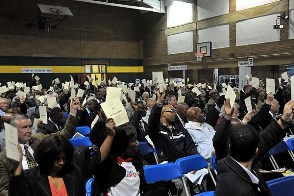Pitcairn Island has a new Constitution, the fourth in the island’s 219-year European-Polynesian history, and although its provisions are being followed on the island its people have not yet formally voted on it.
The new Constitution was accepted by the Pitcairn Island Council in August 2008, on the urging of the Auckland-based Pitcairn Commissioner Leslie Jacques, but the Pitcairn people have as yet not voted to accept the document, nor has it been officially promulgated on the island.
Characterized as being "more democratic in that it brings the Island Council closer to the people" than the previous system, the new Constitution does not set well with some Pitcairners as far as being able to determine their own fate is concerned.
"Nothing that we see has changed," said one islander. "Everything is still subject to the Governor’s approval." The Pitcairn governor, appointed by the United Kingdom, resides in Wellington, New Zealand, some 4,000 miles from Pitcairn.
Conceding that the document is still very new and not fully tested, an islander said, "If there is a change, it might surface during the coming months, as this is still quite a new system."
Under the new Constitution, the Pitcairn mayor is the leading governmental authority on the island and is elected every three years. He is assisted by a deputy mayor. The mayor heads the 10-member, regularly-meeting Island Council. Answering to the Council are four division managers who head community development, natural resources, operations and works, and economics and finance activity on the island.
The new Pitcairn Constitution is a result of promises by the United Kingdom to give its overseas territories greater freedom in determining their own futures. Earlier Pitcairn Constitutions were enacted in 1838, 1893, and 1904.
The 1838 Pitcairn Constitution was written at the Pitcairners’ request by Captain Russell Elliott, a British naval officer. It gave Pitcairn women the right to vote, and mandated education for all Pitcairn children from ages six to 16. Thus Pitcairn Island is likely the first place in the world to have granted suffrage to women.
According to Pitcairn Mayor Michael Warren, the new government structure provided for in the new Constitution came into operation on April 1, 2009.
"The new system comes under the umbrella of The British White Paper on Partnership and Progress which outlines the relationship between Britain and her Overseas Territories," said Warren. "It sets the perimeters in allowing the Territories to determine their own future, and make their own decisions regarding their own destiny."
Also under the new governmental structure, said Warren, "The Island Council is left more clearly to govern, there is a clearer division and devolution of responsibility with all operations falling into one of four departments."
"Much of the work previously undertaken by the Pitcairn Island Office in New Zealand will in the future be decided on-Island; the Island will be more autonomous, and have more responsibility for its own decisions," Warren stated. [Editor: Herb Ford, Director, Pitcairn Islands Study Center, Angwin, California/USA]

